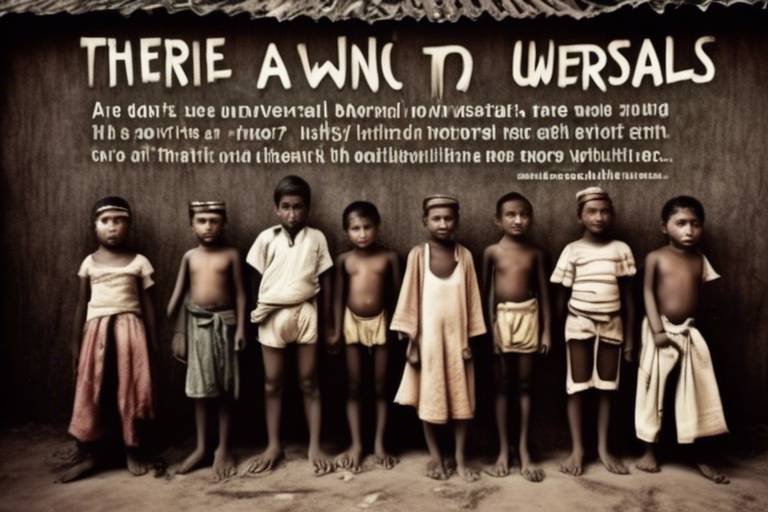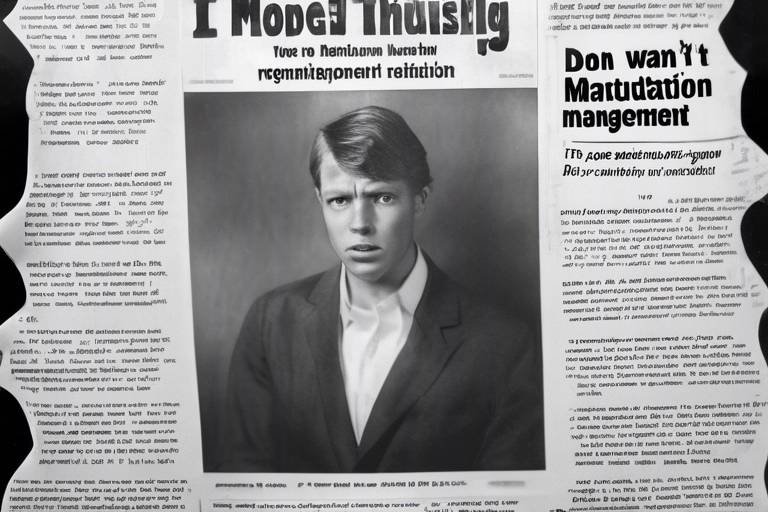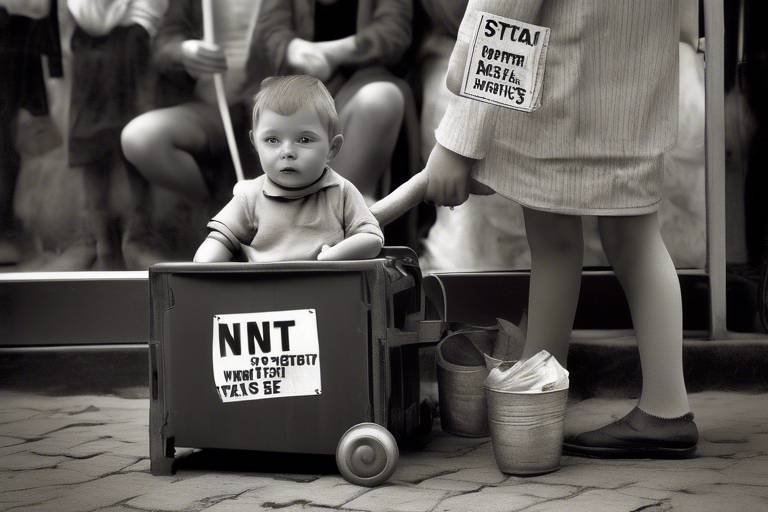The Role of Honesty in Moral Decision Making
Honesty is often heralded as a virtue, but its role in moral decision-making is profound and multifaceted. Imagine navigating through life without a compass; that's what making ethical choices feels like without honesty. It acts as the guiding principle that helps individuals discern right from wrong, shaping not only personal integrity but also the fabric of relationships and society at large. In a world filled with competing interests and diverse perspectives, honesty stands out as a beacon of clarity, illuminating the path toward ethical behavior.
When we talk about honesty, we're not just referring to the absence of deceit. It's about being truthful in our thoughts, words, and actions. This encompasses a range of behaviors, from the simple act of telling the truth to the more complex commitment to transparency in our dealings with others. Honesty fosters an environment where trust can flourish, allowing individuals to engage with one another openly and authentically. Without it, relationships can become fraught with suspicion, leading to misunderstandings and conflict.
Furthermore, honesty is not just a personal value; it has societal implications as well. When communities prioritize honesty, they cultivate a culture of accountability and respect. This can lead to more effective governance, stronger community bonds, and a greater sense of collective responsibility. In contrast, a lack of honesty can erode trust in institutions, creating a cycle of cynicism and disengagement.
Ultimately, the role of honesty in moral decision-making cannot be overstated. It serves as the bedrock upon which ethical behavior is built, influencing everything from personal integrity to societal norms. As we explore the various dimensions of honesty throughout this article, we will uncover its significance in shaping our moral compass and fostering deeper connections with others.
Understanding what honesty truly means is essential for moral decision-making. At its core, honesty is the quality of being truthful and transparent in our communications and actions. It goes beyond merely avoiding lies; it involves a commitment to integrity, sincerity, and fairness. In personal contexts, honesty manifests in straightforward communication with friends, family, and oneself. Socially, it encompasses the ethical responsibility we have towards others, ensuring that our actions align with our words.
Honesty forms the foundation of ethical behavior. It is crucial in maintaining moral integrity and fostering trust in relationships and communities. When individuals act honestly, they not only uphold their own values but also encourage others to do the same, creating a ripple effect of ethical behavior.
Personal integrity is closely tied to honesty. When individuals commit to being honest, they develop a stronger sense of self and a clearer moral compass. This alignment between their values and actions shapes their decisions and enhances their overall character.
Dishonesty can lead to various negative outcomes. The repercussions of dishonest actions can be far-reaching, affecting personal relationships, professional life, and societal norms. For instance, a lie told to a friend can damage trust, while dishonesty in the workplace can lead to a toxic environment and reduced morale.
Trust is essential in any relationship, and honesty serves as its cornerstone. By being honest, individuals create a safe space for open dialogue, where both parties feel valued and respected. This trust is vital for collaboration, whether in personal relationships or professional settings.
In the workplace, honesty is vital for effective communication and collaboration. Ethical decision-making is heavily influenced by honesty, as it encourages transparency and accountability among colleagues. When employees feel they can trust one another, they are more likely to work together effectively and contribute to a positive work culture.
Different cultures view honesty through various lenses. Cultural beliefs significantly shape perceptions of honesty and its role in moral decision-making. While some cultures may prioritize collective honesty, others may focus on individual integrity, leading to diverse interpretations of what it means to be honest.
Honesty plays a pivotal role in resolving conflicts. Transparent communication can lead to effective problem-solving and restore relationships. When parties are open and honest about their feelings and perspectives, they are better equipped to find common ground and work towards a resolution.
Instilling honesty in children is crucial for their moral development. Parents and educators can promote honesty as a core value by modeling honest behavior and fostering an environment where truthfulness is celebrated. Strategies such as open discussions about the importance of honesty and recognizing honest actions can help shape the next generation's ethical framework.
- What is the definition of honesty? Honesty is the quality of being truthful and transparent in one’s words and actions.
- Why is honesty important in ethics? Honesty is crucial for maintaining moral integrity and fostering trust in relationships and communities.
- How does dishonesty affect relationships? Dishonesty can damage trust, leading to misunderstandings and conflict.
- What role does honesty play in conflict resolution? Honesty facilitates transparent communication, which is essential for effective problem-solving.
- How can we teach honesty to children? By modeling honest behavior and encouraging open discussions about its importance.

The Definition of Honesty
Understanding what honesty truly means is essential for moral decision-making. At its core, honesty is the quality of being truthful, sincere, and free from deceit. It’s not just about telling the truth; it’s about embodying a sense of integrity that permeates every aspect of life. When we think about honesty, we often associate it with straightforwardness and transparency in our interactions with others. However, honesty encompasses much more than just verbal communication; it includes our actions, intentions, and even our thoughts.
In personal contexts, honesty can be seen as a form of self-respect. When individuals are honest with themselves, they acknowledge their feelings, desires, and shortcomings. This self-awareness leads to a stronger sense of identity and purpose. On the other hand, dishonesty, whether towards oneself or others, can create a web of confusion and conflict, leading to a dissonance that can be difficult to untangle.
In a social context, honesty serves as a foundational element for trust and cooperation. When people are honest, it fosters an environment where open communication flourishes. This is particularly important in relationships, where honesty can strengthen bonds and promote understanding. However, honesty is not always black and white. It can come in various shades, such as:
- Absolute Honesty: Being completely truthful in every situation.
- Contextual Honesty: Adjusting the truth based on the context without being deceitful.
- Brutal Honesty: Speaking the truth in a way that may hurt others, often seen as lacking empathy.
Each of these forms of honesty has its place in moral decision-making. The challenge lies in finding the balance between being truthful and being considerate of others' feelings. This is where the moral implications of honesty come into play. It’s essential to recognize that honesty is not merely a personal virtue; it’s a social contract that binds us together. When we uphold honesty in our interactions, we contribute to a culture of trust and respect, which is vital for the well-being of any community.
In summary, honesty is a multifaceted concept that plays a crucial role in personal integrity and societal relationships. It’s not just about what we say; it’s about who we are and how we choose to engage with the world around us. Understanding the depths of honesty can empower individuals to make ethical choices that resonate with their values and positively impact their surroundings.

The Importance of Honesty in Ethics
Honesty is not just a virtue; it is the very bedrock of ethical behavior. When we think about ethics, we often consider the principles that guide our actions and decisions. In this context, honesty acts as a guiding star, illuminating the path toward moral integrity. Without honesty, ethical frameworks can crumble, leading to confusion and mistrust. Imagine a world where everyone is honest; it would be a place where trust flourishes, relationships deepen, and communities thrive. On the flip side, a lack of honesty can create a chaotic environment where deceit and dishonesty reign supreme.
One of the key reasons why honesty is crucial in ethics is that it fosters trust. Trust is the glue that holds relationships together, whether they are personal, professional, or societal. When people are honest, they build a foundation of trust that allows for open communication and collaboration. This, in turn, leads to a more harmonious society. Just think about it: have you ever had a friend who lied to you? It’s likely that your relationship suffered as a result. Trust was broken, and it takes time and effort to rebuild it.
Moreover, honesty enhances accountability. When individuals are honest about their actions, they are more likely to take responsibility for their decisions. This accountability is essential for personal growth and ethical development. It encourages individuals to reflect on their choices and learn from their mistakes. In contrast, dishonesty often leads to a cycle of blame and avoidance, where individuals refuse to acknowledge their shortcomings. This not only hampers personal development but also affects the moral fabric of society.
To illustrate the importance of honesty in ethics, consider the following aspects:
- Transparency: Honesty promotes transparency, allowing individuals and organizations to operate in an open manner. This transparency is vital for ethical decision-making.
- Integrity: An honest person demonstrates integrity, which is crucial for building credibility and respect among peers.
- Social Cohesion: Honesty fosters a sense of community and belonging, as people feel safe and valued in an honest environment.
In conclusion, the importance of honesty in ethics cannot be overstated. It is the cornerstone upon which trust, accountability, and integrity are built. In a world where honesty prevails, ethical behavior becomes second nature, leading to stronger relationships and a more cohesive society. So, the next time you face a moral decision, ask yourself: is honesty guiding my choice? If the answer is yes, you’re likely on the right path.

When we talk about personal integrity, we’re diving into the very essence of who we are as individuals. At its core, personal integrity is about being true to oneself and adhering to a set of moral principles. Honesty is the bedrock upon which this integrity stands. Imagine a house built on sand; it may stand for a while, but eventually, it will crumble. Similarly, without honesty, the structure of our integrity can easily collapse under pressure. When we choose to be honest, we not only align our actions with our values but also reinforce our self-respect and self-worth.
Being honest isn’t always the easy path; sometimes, it feels like walking a tightrope, especially when faced with difficult situations. However, embracing honesty allows us to cultivate a clear conscience. It’s like cleaning your windows; once they’re clear, you can see the world outside without distortion. When we are honest, we can make decisions that reflect our true selves, leading to a greater sense of fulfillment and purpose in life. This authenticity draws people to us, creating deeper and more meaningful connections.
Moreover, honesty shapes our moral compass. Think of it as the North Star guiding sailors through the night. When we are honest, we can navigate through life’s challenges with clarity and confidence. We are less likely to engage in actions that contradict our values, which can lead to inner turmoil and guilt. Instead, we can stand firm in our beliefs and face the world with an unwavering spirit.
Honesty also plays a crucial role in how we perceive ourselves. When we are truthful, we build a positive self-image. On the flip side, dishonesty can lead to a fragmented sense of self. It’s like wearing a mask; while it may hide our true feelings temporarily, it can create a disconnect between who we are and how we present ourselves to the world. This dissonance can lead to stress, anxiety, and a host of other emotional issues.
In the broader context, honesty influences our relationships. When we are honest with ourselves, we tend to be honest with others. This transparency fosters trust and respect, which are vital components of any healthy relationship. People are more likely to confide in us and seek our advice when they know we are genuine. Conversely, dishonesty can lead to misunderstandings and conflicts, eroding the foundation of even the strongest bonds.
In summary, the link between honesty and personal integrity is undeniable. By embracing honesty, we not only enhance our self-worth but also strengthen our relationships and navigate life’s complexities with grace. Just like a compass that always points north, honesty keeps us aligned with our values, guiding us toward a life of integrity and authenticity.
- Why is honesty important for personal integrity?
Honesty is essential for personal integrity because it aligns our actions with our values, reinforcing our self-respect and guiding our decisions. - How does dishonesty affect relationships?
Dishonesty can lead to misunderstandings and conflicts, eroding trust and respect in relationships. - Can honesty improve self-esteem?
Yes, being honest helps build a positive self-image and fosters a sense of authenticity, which can enhance self-esteem. - What are the consequences of living dishonestly?
Living dishonestly can lead to emotional stress, anxiety, and a fragmented sense of self, making it difficult to maintain healthy relationships.

The Consequences of Dishonesty
Dishonesty can be likened to a ticking time bomb; it may seem harmless at first, but the longer it sits unaddressed, the more destructive its impact can become. When we choose to be dishonest, we not only compromise our own integrity but also set off a chain reaction that affects those around us. The consequences of dishonesty can manifest in various forms, leading to significant repercussions in personal relationships, professional settings, and societal norms.
In personal relationships, dishonesty can erode trust, which is the bedrock of any meaningful connection. Imagine a friendship where one person consistently lies. Over time, the other person may begin to feel betrayed, leading to feelings of resentment and anger. This breakdown of trust can result in the dissolution of the relationship, leaving both parties feeling hurt and disillusioned. Studies have shown that over 70% of individuals report that dishonesty has significantly damaged their relationships, highlighting just how critical honesty is in maintaining healthy connections.
In the professional realm, dishonesty can have even more severe consequences. A workplace built on deceit is a fertile ground for conflict and mistrust. Employees may feel anxious, fearing that their colleagues are not being truthful. This lack of transparency can lead to a toxic work environment, where collaboration suffers and productivity declines. For instance, consider a scenario where an employee lies about meeting a deadline. Not only does this affect their own credibility, but it also impacts the entire team's performance, potentially leading to missed opportunities and financial losses.
Furthermore, dishonesty can have broader societal implications. When individuals or organizations engage in dishonest practices, they contribute to a culture of mistrust. This can manifest in various ways, such as increased skepticism towards institutions, reduced civic engagement, and a general decline in moral standards. A society where dishonesty prevails may struggle to unite around common goals, leading to fragmentation and conflict. In essence, the ripple effects of dishonesty can undermine the very fabric of community and cooperation.
To illustrate the multifaceted consequences of dishonesty, consider the following table that outlines various impacts across different domains:
| Domain | Consequences |
|---|---|
| Personal Relationships | Loss of trust, emotional pain, relationship breakdown |
| Professional Settings | Toxic work environment, decreased productivity, loss of credibility |
| Societal Norms | Cultural mistrust, civic disengagement, moral decline |
In conclusion, the consequences of dishonesty are far-reaching and can lead to a cascade of negative outcomes. It is essential to recognize the importance of honesty in our daily lives and the profound impact it has on our relationships, careers, and society as a whole. By fostering a culture of honesty, we can build stronger connections, create healthier workplaces, and contribute to a more trustworthy society.
- What are some common forms of dishonesty? Dishonesty can take many forms, including lying, cheating, and omitting important information.
- How can dishonesty affect mental health? Engaging in dishonest behavior can lead to feelings of guilt, anxiety, and stress, impacting overall well-being.
- Can honesty improve relationships? Yes! Being honest fosters trust, which is essential for building strong and meaningful connections.
- What steps can I take to be more honest? Start by being truthful in small matters, practice transparency, and reflect on the importance of integrity in your life.

Building Trust through Honesty
Trust is the invisible thread that weaves together the fabric of our relationships, both personal and professional. When we think about trust, we often think about the promises made between friends, the commitments upheld in partnerships, and the integrity maintained in workplaces. At the core of this trust lies honesty. Without it, relationships can fray and unravel, leading to misunderstandings and conflicts. But how exactly does honesty build trust, you might wonder? Let's dive into this intriguing connection.
When someone is consistently honest, they create a sense of predictability in their interactions. This predictability is vital because it allows others to feel secure in their relationships. Imagine a scenario where a friend always tells you the truth, even when it’s uncomfortable. Over time, you begin to rely on their words, knowing that they won't sugarcoat reality. This is the essence of trust—knowing that you can count on someone to be genuine, no matter the circumstances.
Moreover, honesty fosters an environment where open communication thrives. In any relationship, whether it's with a partner, a colleague, or even a family member, being able to express thoughts and feelings without fear of judgment is crucial. When honesty is prioritized, it encourages others to share their truths as well. This two-way street of communication not only strengthens bonds but also allows for deeper understanding and connection. As the saying goes, “Honesty begets honesty.”
In professional settings, the importance of honesty cannot be overstated. Companies that prioritize transparency and integrity tend to have stronger teams and higher employee morale. When employees know that their leaders are honest, they feel more valued and respected. This leads to a culture of trust where team members feel empowered to share ideas, voice concerns, and collaborate effectively. In fact, studies have shown that organizations with high trust levels see increased productivity and lower turnover rates.
However, building trust through honesty isn't just about being truthful; it's also about consistency. It's essential to demonstrate honesty over time. A single act of dishonesty can tarnish a relationship, while consistent honesty can reinforce trust and loyalty. Think of trust as a delicate glass sculpture; one crack can lead to a cascade of fractures. Thus, maintaining honesty in all interactions is crucial for nurturing and sustaining trust.
In conclusion, honesty is not merely a moral choice; it is the bedrock upon which trust is built. By fostering open communication, creating a sense of security, and demonstrating consistency, honesty paves the way for stronger, more meaningful relationships. Whether in personal life or at work, embracing honesty can transform the way we connect with others, ultimately leading to a more harmonious existence.
- Why is honesty important in relationships?
Honesty is vital in relationships as it fosters trust, encourages open communication, and strengthens the bond between individuals.
- How can I practice honesty in my daily life?
Practicing honesty involves being truthful in your interactions, sharing your thoughts and feelings openly, and maintaining transparency in your actions.
- What are the consequences of dishonesty?
Dishonesty can lead to broken trust, damaged relationships, and a negative reputation both personally and professionally.
- Can honesty improve workplace dynamics?
Yes, honesty in the workplace enhances communication, boosts morale, and fosters a culture of collaboration and respect among team members.

Honesty in Professional Settings
In the fast-paced world of business, where decisions can have significant repercussions, honesty emerges as a non-negotiable virtue. Imagine walking into a workplace where every individual is transparent and sincere; it would not only foster a positive atmosphere but also enhance productivity. Honesty in professional settings is like the glue that holds everything together—without it, relationships can become strained, and trust can erode. When employees and employers communicate openly, it creates a culture where everyone feels valued and respected.
Consider the implications of dishonesty in the workplace. A single lie can create a ripple effect, leading to misunderstandings, conflicts, and even legal troubles. For instance, if a manager provides misleading information about a project’s status, it can result in misallocated resources and missed deadlines. The consequences of such dishonesty can be dire, affecting not just the individuals involved but the entire organization. This is why fostering an environment where honesty is prioritized is essential for long-term success.
Moreover, honesty enhances collaboration. When team members are forthright about their capabilities and challenges, it allows for more effective problem-solving. Imagine a team working on a project; if everyone is honest about their progress and hurdles, they can support each other better. This open communication leads to innovative solutions that might not have emerged in a less transparent environment. In contrast, a lack of honesty can lead to a toxic workplace where mistrust reigns, stifling creativity and collaboration.
To illustrate the importance of honesty in professional settings, let’s take a look at a simple table that highlights some key benefits:
| Benefit | Description |
|---|---|
| Enhanced Trust | Honesty builds trust among colleagues, which is essential for teamwork. |
| Improved Communication | Open dialogue encourages sharing of ideas and feedback. |
| Stronger Relationships | Honesty fosters deeper connections and mutual respect. |
| Better Decision Making | Transparent information leads to informed choices and strategies. |
In conclusion, honesty in professional settings is not merely a moral choice; it’s a strategic advantage. Organizations that prioritize honesty tend to have higher employee satisfaction, lower turnover rates, and better overall performance. So, the next time you find yourself in a professional dilemma, remember that choosing honesty can pave the way for success and create a workplace where everyone thrives.
- Why is honesty important in the workplace?
Honesty promotes trust, enhances communication, and fosters a positive work environment, all of which are essential for organizational success.
- How can I encourage honesty among my team?
Lead by example, create an open environment for feedback, and recognize and reward honesty in your employees.
- What are the consequences of dishonesty in a professional setting?
Dishonesty can lead to mistrust, decreased morale, legal issues, and ultimately, a toxic work environment.

Cultural Perspectives on Honesty
Honesty is a concept that transcends borders, yet its interpretation can vary dramatically from one culture to another. In some societies, honesty is seen as an absolute moral imperative, while in others, the context of a situation can lead to different conclusions about what it means to be honest. For example, in many Western cultures, being straightforward and direct is often valued highly. People are encouraged to express their thoughts and feelings openly, which fosters an environment where honesty is expected. However, in certain Eastern cultures, the emphasis may be placed on maintaining harmony and respect over blunt honesty. In these contexts, telling a 'white lie' might be considered more ethical than risking offense or conflict.
Let’s take a closer look at how different cultures perceive honesty:
| Cultural Context | View on Honesty | Examples |
|---|---|---|
| Western Cultures | Honesty is a moral obligation; direct communication is valued. | United States, Canada, Germany |
| Eastern Cultures | Contextual honesty; preserving relationships may take precedence. | Japan, China, India |
| Middle Eastern Cultures | Honesty is important, but communal values may influence communication. | Saudi Arabia, UAE, Egypt |
This table offers a glimpse into how cultural backgrounds shape our understanding of honesty. In many cultures, the concept of collectivism plays a significant role. Here, the needs of the group may outweigh the individual's right to express unfiltered honesty. For instance, a person may choose to withhold their true feelings about a family decision to avoid causing distress or discord within the family unit. This is not considered dishonesty; rather, it's viewed as a way to protect relationships and maintain social cohesion.
Moreover, the concept of face-saving is prevalent in numerous cultures. This refers to the act of preserving one's dignity and reputation in social contexts. In such cultures, being honest to the point of hurting someone's feelings can be seen as a breach of social norms. Thus, individuals may opt for a more tactful approach, which may involve bending the truth slightly to avoid confrontation.
When examining cultural perspectives on honesty, it is essential to consider the role of education and socialization. Children are taught the values of their culture from a young age, shaping their understanding of honesty. In cultures that prioritize communal values, children may learn to value harmony over blunt truth-telling, while those raised in individualistic societies may be encouraged to express their opinions freely, regardless of potential repercussions.
In conclusion, the cultural lens through which honesty is viewed can significantly influence moral decision-making. Understanding these perspectives not only fosters empathy but also enhances our ability to navigate complex social interactions. As we continue to interact in an increasingly globalized world, recognizing and respecting these differences in cultural perceptions of honesty will be crucial for building effective and harmonious relationships.

Honesty in Conflict Resolution
When it comes to resolving conflicts, honesty is not just a nice-to-have; it's an absolute necessity. Imagine trying to build a house on a shaky foundation—without honesty, the structure of any relationship is bound to crumble. Whether in personal relationships, workplaces, or even in larger community settings, the ability to communicate openly and truthfully can be the difference between a resolution that heals and one that deepens the divide.
Honesty acts as the glue that holds conversations together during conflicts. When parties involved in a disagreement commit to being honest, they create an environment where everyone feels safe to express their thoughts and feelings. This transparency fosters understanding, allowing individuals to see the situation from multiple perspectives. For example, if two coworkers are at odds over a project, approaching the discussion with honesty about their concerns and feelings can lead to a collaborative solution rather than a bitter standoff.
Moreover, honesty in conflict resolution helps to identify the root causes of disputes. Often, conflicts arise not from the immediate issue at hand but from underlying misunderstandings or unspoken grievances. By being forthright, individuals can uncover these hidden layers, which can be crucial for a lasting resolution. Think of it as peeling an onion—each layer represents a different issue, and only by addressing them all can you reach the core.
However, honesty does not mean brutal honesty. It’s essential to communicate truthfully while also being considerate of the other person’s feelings. This is where the art of effective communication comes into play. Here are some key strategies that can help maintain honesty while also being mindful of how the message is delivered:
- Use "I" Statements: Frame your feelings and thoughts from your own perspective to avoid sounding accusatory. Instead of saying "You never listen," try "I feel unheard when my ideas are dismissed."
- Be Specific: Vague accusations can lead to defensiveness. Instead, provide clear examples of the behavior that concerns you.
- Stay Calm: Emotionally charged discussions can derail honesty. Take a moment to breathe and collect your thoughts before responding.
In addition to promoting understanding, honesty can also pave the way for forgiveness. When individuals acknowledge their mistakes and communicate them openly, it creates a pathway for healing. Forgiveness is often a two-way street, and honesty can help both parties move beyond the hurt and towards reconciliation. This is particularly important in personal relationships where trust has been damaged; being honest about feelings can restore that trust over time.
Ultimately, the role of honesty in conflict resolution cannot be overstated. It is the beacon that guides individuals through the murky waters of disagreement, illuminating the path toward understanding and resolution. Just like a compass, honesty directs us to the true north of our values and helps us navigate the complexities of human interactions. In a world where conflicts are inevitable, embracing honesty can transform disputes into opportunities for growth and connection.
- Why is honesty important in conflict resolution? Honesty fosters open communication, helps identify the root of conflicts, and promotes understanding and forgiveness.
- How can I be honest without hurting someone's feelings? Use "I" statements, be specific about your concerns, and maintain a calm demeanor during discussions.
- Can honesty really improve relationships? Yes, honesty builds trust, strengthens connections, and allows for healthier, more open communication.

Teaching Honesty to Future Generations
Teaching honesty to future generations is not just a noble endeavor; it’s a vital investment in the fabric of society. Imagine a world where children grow up valuing truth as much as they value friendship or kindness. This is the kind of world we can create by instilling the principles of honesty early on. But how do we effectively teach our kids to embrace honesty? It involves more than just telling them to “always tell the truth.” It’s about modeling behavior, creating an environment that nurtures transparency, and reinforcing the importance of integrity in everyday situations.
One of the most effective methods is through role modeling. Children are like sponges; they absorb everything they see. When parents and educators demonstrate honesty in their actions, children are more likely to emulate that behavior. For instance, if a parent admits to a mistake and discusses how they plan to rectify it, they’re showing their child that honesty is not just about avoiding lies, but also about owning up to one’s actions. This kind of transparency fosters an environment where children feel safe to express themselves honestly.
Additionally, it’s essential to create open lines of communication. Encourage children to share their thoughts and feelings without fear of judgment. When kids know they can speak freely, they’re more likely to be truthful. Ask them questions about their day, and listen actively to their responses. This not only builds trust but also reinforces the notion that honesty is valued in your relationship.
Moreover, discussing the consequences of dishonesty in a constructive manner can be enlightening. Instead of scolding them for a lie, engage them in a conversation about how dishonesty can affect relationships and trust. For example, you might say, “When you didn’t tell me about the broken vase, it made me feel like I couldn’t trust you. Trust is important in our family.” This approach helps children understand the emotional impact of their actions, making the lesson more relatable and memorable.
To further emphasize the value of honesty, consider using stories and examples. Children love stories, and they can be a powerful tool for teaching moral lessons. Whether it’s through fairy tales or real-life anecdotes, stories that highlight the importance of honesty can resonate deeply. Discuss characters who faced dilemmas and had to choose between honesty and deceit. Ask your children what they think the characters should have done and why. This not only engages their critical thinking skills but also reinforces the value of honesty in a fun and relatable way.
Incorporating activities that promote honesty can also be beneficial. For instance, you could create a “Truth Jar” where family members anonymously write down times they felt proud of being honest. Once a week, read them together and celebrate those moments. This not only creates a positive association with honesty but also reinforces the idea that being truthful is something to be proud of.
Finally, be patient and consistent. Instilling honesty is not a one-time conversation; it’s an ongoing process. Celebrate small victories and gently correct dishonesty when it occurs. Remember, teaching honesty is about building a strong moral foundation that children can carry into adulthood. With time and effort, we can raise a generation that values truth and integrity, ultimately leading to stronger relationships and a more trustworthy society.
- Why is honesty important in teaching children? Honesty helps children develop trust, integrity, and a strong moral compass, which are essential for healthy relationships.
- How can I model honesty for my children? Demonstrate honesty in your own actions, admit mistakes, and communicate openly about your feelings and decisions.
- What are some effective ways to discuss dishonesty with children? Use constructive conversations to explain the consequences of dishonesty and engage them in discussions about trust and feelings.
- Can storytelling help teach honesty? Yes, stories can illustrate the importance of honesty and help children relate to moral dilemmas in a fun and engaging way.
Frequently Asked Questions
- What is the definition of honesty?
Honesty is the quality of being truthful, sincere, and straightforward in one's words and actions. It involves being open about one’s thoughts and feelings, and it is a fundamental aspect of moral decision-making.
- Why is honesty important in ethics?
Honesty is crucial in ethics because it lays the groundwork for moral integrity. It fosters trust in relationships and communities, making it easier for individuals to collaborate and communicate effectively.
- How does honesty relate to personal integrity?
Personal integrity is deeply connected to honesty. Being honest helps individuals align their actions with their values, creating a strong sense of self and guiding their moral compass in decision-making.
- What are the consequences of dishonesty?
Dishonesty can lead to a variety of negative outcomes, such as damaged relationships, loss of trust, and even professional repercussions. It can create a ripple effect that affects not only the individual but also their community.
- How can honesty build trust in relationships?
Honesty acts as a cornerstone for trust. When individuals are open and truthful with each other, it fosters a sense of security and reliability, which is essential for any healthy relationship.
- Why is honesty important in professional settings?
In the workplace, honesty is vital for effective communication and collaboration. It encourages transparency, reduces misunderstandings, and enhances teamwork, ultimately contributing to a more productive environment.
- How do cultural perspectives shape views on honesty?
Cultural beliefs significantly influence perceptions of honesty. Different cultures may prioritize various aspects of honesty, leading to diverse interpretations of what it means to be honest in moral decision-making.
- What role does honesty play in conflict resolution?
Honesty is pivotal in resolving conflicts as it encourages transparent communication. By being open about feelings and perspectives, individuals can address issues more effectively and work towards restoring relationships.
- How can parents teach honesty to children?
Parents can promote honesty in children by modeling truthful behavior, encouraging open communication, and discussing the value of honesty in everyday situations. This helps instill honesty as a core value from a young age.



















